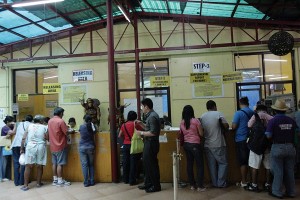Still no birth certificate? Act before it’s too late

PROOF OF BIRTH. A typical queue of applicants for birth certificates at the Manila civil registrar’s office. NIÑO JESUS ORBETA
AT 58, “MYRNA,” a high school teacher, has found herself paying for someone else’s negligence.
Myrna is just one of the 150 to 300 people filing for late birth registration every day at Manila City Hall. Like many in the queue, she has no ready answers for many of the standard questions awaiting her at the registrar’s office.
“I’m not even sure if my parents were really married. I just remember a photo where my mother was dressed in white,” she said.
She said her mother failed to secure a birth certificate for her and her nine siblings. But somehow, she was able to enter and finish college and even work for several years abroad because, according to her, the system for securing passports in the late 1980s was not yet that strict.
But now she urgently needs the certificate to prove that she was born on March 27, 1954 (not 1953 as indicated in all her other school records), or else she would not qualify and secure benefits under a retirement program for teachers.
Article continues after this advertisementCarlito Allarete, 47, a former volunteer fireman who hailed from Cebu City and who now lives alone in a shanty in Tondo, Manila, also wants that piece of paper for many pressing reasons.
Article continues after this advertisementWithout it, for example, he could not renew his voter’s ID. Worse, he may not land a job again even as a construction worker in a company that asks for a birth certificate among the standard requirements.
The National Statistics Office (NSO) in the National Capital Region suggested that he go back to his native Cebu to search for his birth records, an advice he has yet to heed for lack of travel money.
These and other stories have come out following the launch in June of NSO’s “Operation Birth Right,” a program that allows indigents to secure birth certificates for free. Under regular procedures, securing a birth certificate entails a fee of between P200 and P500, depending on the local government unit.
LGU implementation
In Manila, Operation Birth Right is being implemented through satellite offices in each of the city’s six districts.
In Quezon City, where officials estimate that five to seven percent of the population are unregistered, the free registration program has been activated through public schools.
In Makati City, they launched “Civil Registration sa Barangay” or Cresba, which offers free consultation and late registration every Saturday.
According to Makati City Civil Registrar Josephine Copada, Cresba and its counterpart Operation Birth Right have enabled more low-income Filipinos to register, especially those discouraged by the fees. The campaign particularly benefited domestic helpers who needed a passport.
Joy Cabiles of the Adoption Resource and Referral Unit of the Department of Social Welfare and Development explained that aside from problems in proving one’s identity, the lack of a birth certificate could pose many other difficulties later in one’s life.
These include problems enrolling in schools, applying for jobs, securing travel documents, and enjoying other benefits due a citizen. Worse, minors whose age could not be verified through official records may become easy prey to human trafficking syndicates.
There have also been cases of minors in conflict with the law who end up in jails for ordinary criminals because they could not prove they are underage, according to reports from Plan International Philippines, a nongovernment organization for the protection of children.
Worldwide, the United Nations estimates that a total of 51 million newborns go unregistered each year, or two-fifths of the babies born within such period.
‘Hilot’ forgot the paperwork
Long before the UN came up with those figures, Helen Biseder, 31, was already a case in point. She said she grew up without a birth certificate after her mother gave birth to her in Iloilo province with the help of a traditional midwife or hilot instead of a professional who could have helped with the paperwork.
“No one submitted my birth details to the capitol,” said Biseder, whose parents could only send her up to Grade 5.
When the time came for her to find work, she first managed to land a job as a domestic helper. But when she was later hired as a janitress at Negros Navigation in 2005, her contract was cut short when she could not produce a birth certificate as part of her application in the Social Security System.
One of her three children—4-year-old Ronnel—was also born with the help of a hilot and still has to secure a birth certificate.
Biseder said she badly needed the certificates for her and for Ronnel so her family could qualify under the DSWD’s conditional cash transfer program for the country’s poorest.
It’s really all up to parents like her. “We (in the government) cannot monitor every live birth in hospitals and follow up on undocumented births unless parents report them to our office,” said Ma. Josefa Encarnacion Ocampo, head of the Manila civil registrar office.
Civil registrar assistant Ernesto Tepace Jr. said his office usually gets flooded with applications for late birth registration from May to June, just before the opening of a new school year. “They act at the last minute and still expect to get quick results,” he noted.
And like in the case of Myrna, Allerete, etc., failure to act early enough to secure that seemingly simple piece of paper may lead to graver, lifelong consequences.
A list of requirements for late birth registration may be found at the NSO website https://www.manila.gov.ph/ citycivilregistry.htm.